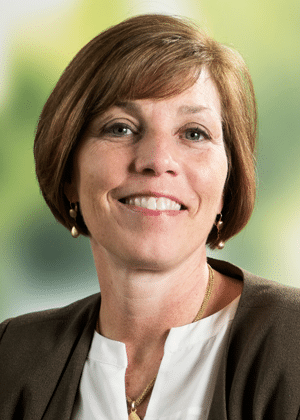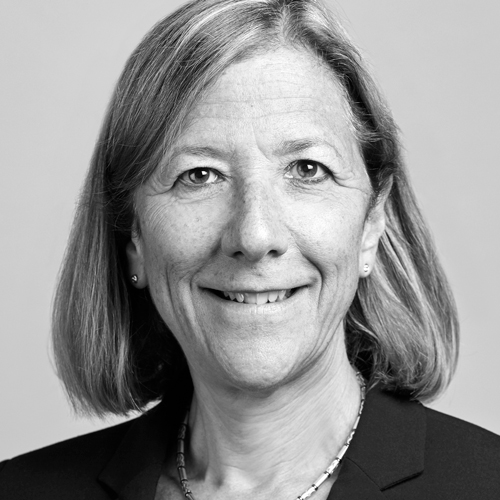According to an old Jerry Seinfeld routine, the toughest part of a pharmacist’s job is typing all the information on the little labels on pill bottles. Sue Mashni, chief pharmacy officer at Mercy Health, feels that idea perfectly reflects the misconceptions about the profession.
“Most people are completely unaware of the work we do and how they benefit from it,” she says. “Making sure medicines are safe and dosed and used appropriately protects millions of lives and prevents tens of millions of dollars in adverse events every year.”
Mashni and her team of seven direct reports are directly responsible for many of those outcomes. She oversees the pharmacy practice at Mercy’s twenty-three hospitals, twenty-five retail pharmacies, and more than twenty ambulatory pharmacy practices across Ohio and Kentucky. This includes teams for population heath, specialty pharmacy, a mail order facility, and Mercy’s pharmacy benefit management relationship for employee health. Programs in her purview include everything from Mercy’s employee diabetes management programs and Meds to Beds, a program that ensures patients receive the proper medicines and understand their use when they are discharged, to developing an opiate prescription reduction initiative.

Prior to moving into leadership positions, she spent years in clinical pharmacy practice and direct patient care. This began in her first internship at Ohio State University, where she worked side by side with nurses as a drug administration technician. After completing her education, she worked in Johns Hopkins University Medical Center’s neuro-ICU and was later hired to help open the neonatal ICU pharmacy at the University of Cincinnati Medical Center. From there, she went to Cincinnati Children’s Hospital Medical Center’s HomeCare & Starshine Hospice.
These are all impressive medical credentials for someone who had originally planned on becoming an engineer. “My mother was a nurse and my father was a pharmacist, but I fainted around blood and decided I needed to find a different path,” Mashni says. “When I studied biochemistry and medicinal chemistry, though, I thought they were absolutely fascinating. Combined with my love of helping people, I knew I had found my way.”
Eventually, Mashni decided that she could have a greater impact by moving from clinical work into leadership roles. The lessons she learned in her clinical experience, however, continue to serve her well as she strives to balance the needs of the Mercy system with those of its local hospitals, physicians’ offices, and staff caring for patients.
For example, when Mashni was developing UC Medical Center’s neonatal ICU pharmacy, she was careful about how she approached her relationships with the nurses, who were used to working independently without direct interactions with the pharmacists.
“We had to insert ourselves into the workflow by demonstrating our value and always having an attitude of service toward the nurses,” she says. “We made it clear we weren’t the pharmacy police and showed how we could be supportive by introducing best practices that improved safety, saved time, made their work easier, and benefitted the patients.”
Mashni drew on those interpersonal skills again when she was part of the team that developed Mercy’s standardized system-wide formulary. At that time, the system’s hospitals shared drug suppliers, but had no impetus to coordinate their purchases. The introduction of Mercy’s EMR platform changed that.
“We worked through a three-year plan to review every class of drugs to come up with standard choices based on evidence, quality, cost of care, and availability,” Mashni explains. “It was difficult getting everyone to agree, but we continually collaborated through site visits, included representatives from every department, and later developed drug monographs based on clinical evidence, our use patterns, and proposed utilization.”
Four years after launching the initiative, Mercy realized a cumulative savings of $50 million in drug costs.
Mashni was also involved in the development of clinical content for four hundred standard order sets within the system’s EMRs, 70 percent of which consist of pharmaceutical information. She worked with physicians and nurses to create drug and treatment options that streamline care and administration, can be personalized to reflect a clinician’s standard care choices, and improve outcomes.
In addition to spearheading these clinical programs, Mashni is also involved with Mercy’s business development team. Currently, it is exploring ways to provide its pharmacy management and clinical expertise to outside clients. The company is also a joint venture partner with for-profit revenue cycle company Ensemble and is looking for more opportunities for pioneering nonprofit and for-profit partnerships. Mashni credits many of these successes to the organization’s willingness to listen to her and her pharmacy team.
“Mercy’s culture values the pharmacist’s perspective,” she says. “There was recognition from the very beginning of the process that our input was needed to ensure that the medications used in order sets were efficient, safe, and cost-effective.”
Photo by Kimberly Campbell
Premier is proud to partner with dedicated professionals such as Dr. Sue Mashni, chief pharmacy officer at Mercy Health, to transform the future of the healthcare industry. Congratulations on your recognition from American Healthcare Leader magazine. Premier is a healthcare improvement company uniting an alliance of approximately 3,900 US hospitals and more than 150,000 other provider organizations.


